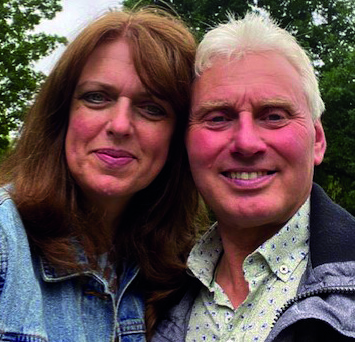

YES
Nigel and Chris Dakin
OWNERS OF THE DOLLS HOUSE NURSERY, LEICESTER (PRE-SCHOOL AND NURSERY REGISTERED AS TWO SETTINGS)

The 20th birthday of our nursery saw a period in which our staff team worked through Covid lockdown.
Our pre-school was awarded Ofsted Inadequate (from Outstanding), which closed half of our operation and saw a talented young manager resign from the childcare sector. Shortly afterwards, our nursery received a ruling of ‘requires improvement’ (from Good) on what remained of our nursery.
Just one word from Ofsted, and we are expected to explain to our supportive parents why we are not adequate to care for their child, and why the local authority, potentially, will be removing the funding for their child's nursery place.
However, through all this, our nursery has never been far away from ten out of ten on reviews, and our parent questionnaire returned a result of 95 per cent ‘excellent’ overall.
During our open day not a single parent questioned, or showed interest in, our ‘requires improvement’ outcome.
I believe that an excellent setting for Ofsted is not an excellent setting for parents and children – and vice-versa. It depends if the caring staff member has an iPad on their lap or a child!
What point is there in producing finely-detailed observations, concentrating in silence while detailing and documenting all aspects of the child's day, while the child misses out on singing, laughing and interactive learning with their teacher.
We, as a nursery, have always, rather nervously, chosen to take a middle line, at the cost, maybe, of an Ofsted Outstanding responding to Ofsted's seasonal whims, and, at the same time, soundly meeting the educational needs of our children and families.
I can only conclude that ‘outdated’ Ofsted with its pointless, draconian, one-word judgements is seen as irrelevant by today's professional parents.
Its unquestioned and largely unregulated snap-shot inspection events are no longer valued by parents or respected by the nursery sector.
I believe that our children could teach Ofsted a thing or two, and I do hope that if a new body ever replaces Ofsted, it practises ‘good listening’ and has a desire to learn and understand. I hope that it has a healthy respect for mature experience and values a heart that cares more than anyone can know.
NO
Cat Hirst
MANAGER, GUILDEN SUTTON DAY NURSERY, CHESTER
 As an early years manager, I strongly believe that Ofsted should continue to have an overall judgement in early years inspections.
As an early years manager, I strongly believe that Ofsted should continue to have an overall judgement in early years inspections.
Ofsted plays a crucial role in ensuring the quality and effectiveness of early years provision, and the provision of an overall judgement is an essential aspect of their assessment process.
Firstly, an overall judgement provides a clear and concise assessment of the quality of early years provision. It helps parents, carers and the wider community to make informed decisions about the setting they choose for their children. By having a standardised rating system, Ofsted enables parents to compare different early years settings and make choices based on the quality of education and care provided. This promotes transparency and accountability.
Secondly, an overall judgement serves as a valuable tool for self-reflection and improvement within our settings. By receiving Ofsted's evaluation, we can identify areas of strength and areas that require further development. This feedback enables us to set goals, make necessary changes, and continuously enhance our provision. It fosters a culture of ongoing improvement and ensures that the needs of children are met at the highest possible standard.
Furthermore, an overall judgement is essential for maintaining quality standards across the early years sector. By having a clear evaluation system, Ofsted sets a benchmark for excellence and provides incentives for settings to strive for continuous improvement. The knowledge that inspections occur, and an overall judgement is given, acts as a catalyst for settings to invest in staff training, resources and infrastructure.
Additionally, an overall judgement allows for intervention in cases where early years provision is inadequate or poses risks to children's wellbeing.
The provision of an overall judgement helps to ensure that any issues or concerns are addressed promptly, providing a safer environment for children to learn and grow.
In conclusion, the continuation of an overall judgement in early years inspections by Ofsted is crucial for the effective evaluation, improvement and accountability of early years settings.
It provides a clear assessment for parents, promotes self-reflection and improvement within settings, maintains quality standards, and safeguards the wellbeing of children. By upholding this practice, Ofsted can continue to play a role in enhancing the quality of early years provision and supporting the development of young children.
We put the question to Nursery World readers
I’m all for scrapping them and that’s speaking as someone whose latest grading was Outstanding. I really don’t like them and too much importance is placed on them.
A judgement which can make or break a setting based on a very brief snapshot. I wish they’d give everyone a brief report highlighting strengths and then support us with any areas where needed in collaboration with what we think our next steps are. It needs to be more supportive and not something to dread. If there’s something we are doing wrong, then support us to correct it.
Sarah Connors Brady, Facebook
Scrap them and then give a short summary of strong points at an inspection, where the strengths lie and then a short list of points for action. The action points should be graded according to their urgency and whether any statutory points are breached. For example:
- Immediate actions required
- Medium term actions required
- Long term actions suggested
The first two for essential legal or safeguarding actions, the last one for pedagogical or minor organisational advice. The first and second with clear deadlines. Ofsted should still have the power to shut down or re-inspect if there are safety issues etc.
The whole thing would be better if we worked to this idea that we reflect on what goes well and are supported to deal with the challenges and pulled up if we have breached best practice or law.
Catherine Morey, Facebook
Whilst I do believe that all settings should be monitored to some extent, for safeguarding reasons if nothing else, I don't believe these should be made public. They should only be, as others have said, a list of ways that the settings could raise quality and standards if needed. They should not cause fear and anxiety and should not be used as marketing tools. Inspectors should also travel in pairs to ensure that the inspection is not biased towards one person's beliefs and expectations and, in an ideal world, should be completed overall several days to get a more authentic image of the day to day routines etc.
Laura Jane, Facebook









